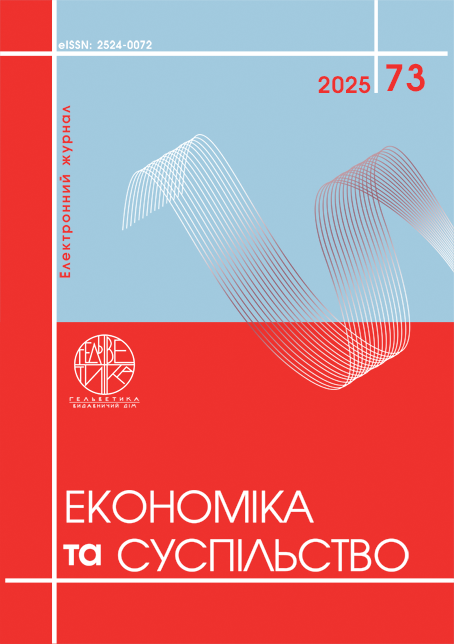STRATEGY FOR THE DEVELOPMENT OF ECONOMIC SECURITY OF ENTERPRISES IN THE CONTEXT OF DIGITAL TRANSFORMATIONS
Abstract
In today's world, where digital technologies are rapidly evolving and globalization is becoming the primary driver of economic change, businesses are compelled to adapt their processes to new challenges in order to maintain stability and competitiveness. In this context, strategic management plays a key role, as its main goal is to integrate innovative approaches, including digital technologies, which allows for optimization of management processes, increased flexibility and prompt decision-making. The article analyzes the main aspects of strategic management of economic security in the context of the digital economy, in particular, based on the works of domestic scholars. The study emphasizes the importance of adapting strategic approaches to the conditions of the digital economy and shows how a properly constructed economic security strategy can become the basis for the successful and sustainable development of an enterprise in the context of digital changes. The paper identifies key factors that affect the effectiveness of digital transformation of enterprises. These include: modern IT infrastructure, level of strategic management, financial capacity, staff readiness to work in the context of digital changes, ability to collect and analyze large amounts of information, as well as the influence of the external environment, in particular through cooperation with technology companies, which ensures the ability of the enterprise to adapt to changes in the business environment. Particular attention is paid to the integration of the latest digital technologies, such as artificial intelligence, blockchain, and modern information infrastructure. This allows not only to improve the processes of collecting and analyzing information, but also to ensure a high level of communication both within the enterprise and with its external environment. The author proposes a mechanism for improving the economic security strategy of an enterprise, which includes the introduction of risk management, cybersecurity, staff development, and the creation of a modern digital infrastructure. Important elements of this strategy are the use of artificial intelligence and blockchain technologies, which help to ensure transparency, reliability and risk reduction in business processes. This integrated approach not only ensures the efficiency of the enterprise in the context of digital transformation, but also contributes to its stable development in a rapidly changing global business environment.
References
Гринько Т.В., Гвініашвілі Т.З., Каліберда М.С. Стратегічне управління підприємством в умовах цифрової економіки України. Економіка та суспільство. 2023. №50. URL: https://economyandsociety.in.ua/index.php/journal/article/view/2440/2360 (дата звернення 29.03.2025)
Кириленко С.В. Системи економічної безпеки в умовах цифрової економіки. Проблеми розвитку економіки. 2024. №1 (18). С.40-47. URL: https://www.researchgate.net/publication/381658667_sistema_ekonomicnoi_bezpeki_v_umovah_cifrovoi_ekonomiki (дата звернення 30.03.2025)
Кульчицький І.І. Цифрова економіка та економічна безпека підприємства: стратегії управління. Актуальні питання економічних наук. 2024. №6. URL: https://doi.org/10.32983/2222-0712-2024-2-181-190 (дата звернення 28.03.2025)
Назаренко С.А, Зачосова Н.В., Мовчанець В.В. Стратегічні цілі механізму управління економічною безпекою в системі стратегічного управління підприємством під впливом кризи в умовах цифровізації. Актуальні питання економічних наук. 2024. №3-4. URL: https://a-economics.com.ua/index.php/home/article/view/26/26 (дата звернення 28.03.2025)
Пілецька С.Т., Ареф’єв С. О., Петровська С.В., Колесников С.О. Стратегічне забезпечення економічної безпеки підприємств в контексті цифровізації економіки України. Проблеми економіки. 2024. №2 (60). C. 181–190. URL: https://doi.org/10.32983/2222-0712-2024-2-181-190 (дата звернення 29.03.2025)
Hrynko T. V., Hviniashvili T.Z., Kaliberda M. S. (2023) Stratehichne upravlinnia pidpryiemstvom v umovakh tsyfrovoi ekonomiky Ukrainy [Strategic management of an enterprise in the digital economy of Ukraine]. Ekonomika ta suspilstvo - Economy and society. vol. 50 Available at: https://economyandsociety.in.ua/index.php/journal/article/view/2440/2360 (accessed March 29, 2025)
Kyrylenko S.V. (2024) Systemy ekonomichnoi bezpeky v umovakh tsyfrovoi ekonomiky [Economic security systems in the digital economy]. Problemy rozvytku ekonomiky - Problems of economic development. vol. 1 (18) Available at: https://www.researchgate.net/publication/381658667_sistema_ekonomicnoi_bezpeki_v_umovah_cifrovoi_ekonomiki (accessed March 30, 2025)
Kulchytskyi I. I. (2024) Tsyfrova ekonomika ta ekonomichna bezpeka pidpryiemstva: stratehii upravlinnia [Digital economy and economic security of the enterprise: management strategies]. Aktualni pytannia ekonomichnykh nauk - Topical issues of economic sciences. vol. 6 Available at: https://doi.org/10.32983/2222-0712-2024-2-181-190 (accessed March 28, 2025)
Nazarenko S. A., Zachosova N. V., Movchanets V.V. (2024) Stratehichni tsili mekhanizmu upravlinnia ekonomichnoiu bezpekoiu v systemi stratehichnoho upravlinnia pidpryiemstvom pid vplyvom kryzy v umovakh tsyfrovizatsii [Strategic Objectives of the Economic Security Management Mechanism in the System of Strategic Management of an Enterprise under the Influence of the Crisis in the Context of Digitalization]. Aktualni pytannia ekonomichnykh nauk - Topical issues of economic sciences. vol. 3-4 Available at: https://a-economics.com.ua/index.php/home/article/view/26/26 (accessed March 28, 2025)
Piletska S.T. Arefiev S. O. Petrovska S. V., Kolesnykov S. O. (2024) Stratehichne zabezpechennia ekonomichnoi bezpeky pidpryiemstv v konteksti tsyfrovizatsii ekonomiky Ukrainy [Strategic Ensuring of Economic Security of Enterprises in the Context of Digitalization of the Ukrainian Economy]. Problemy ekonomiky – Problems of the economy. vol. №2 (60) pp. 181-190 Available at: https://doi.org/10.32983/2222-0712-2024-2-181-190 (accessed March 29, 2025)

This work is licensed under a Creative Commons Attribution 4.0 International License.


